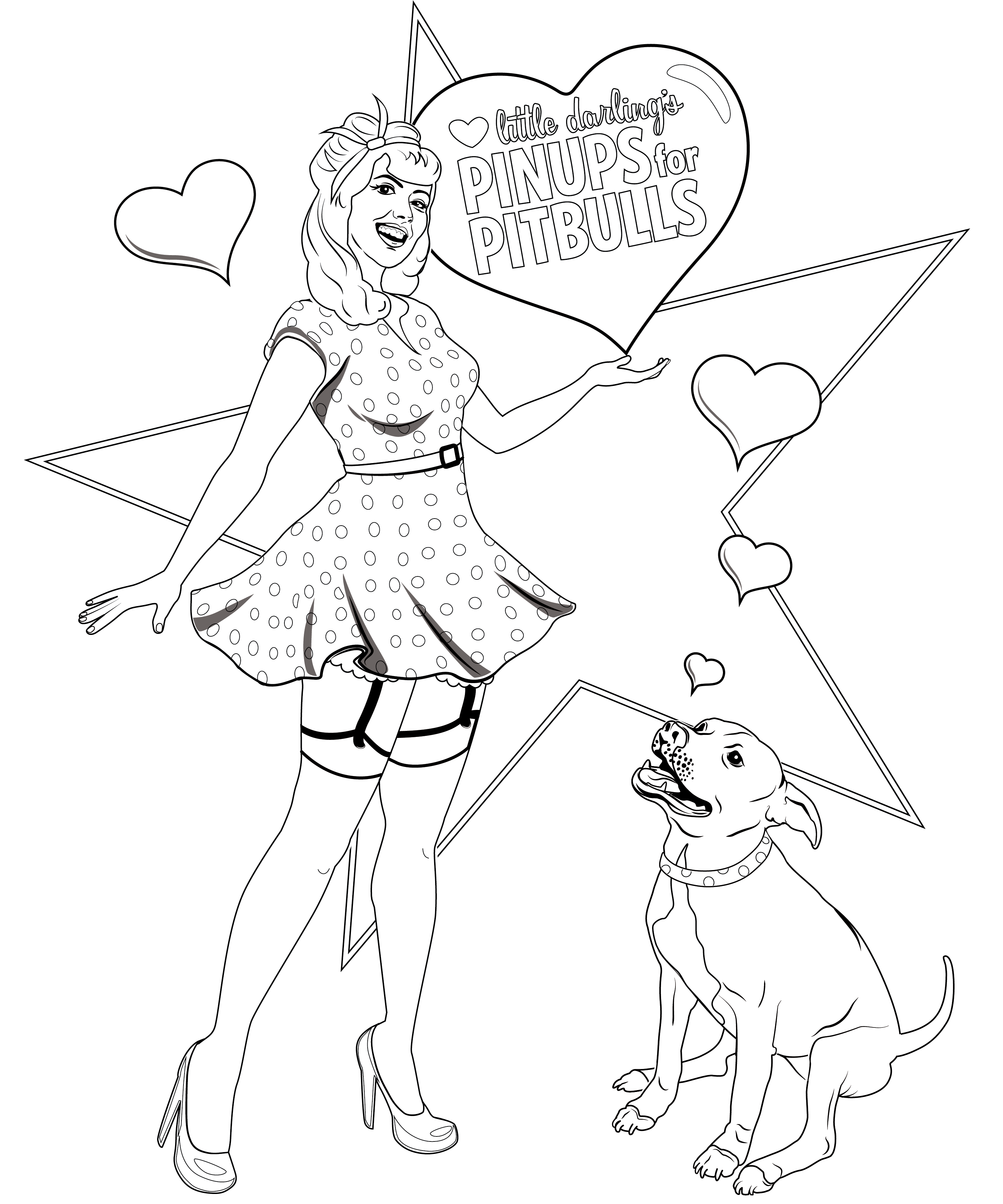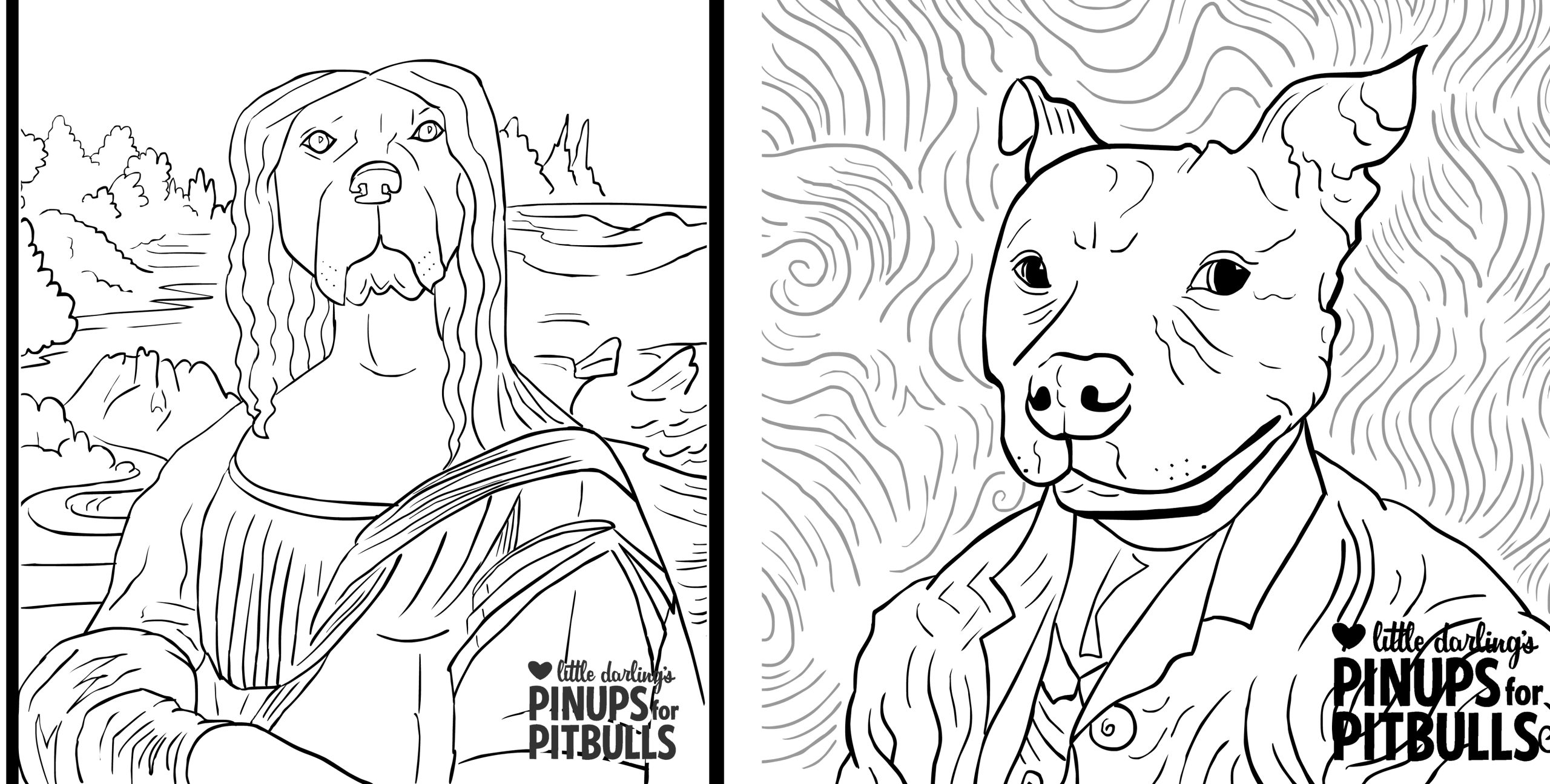Pinups for Pitbulls, Inc. (PFPB) is a registered 501c3 not-for-profit organization. Because of this, funds raised return directly to the cause. Our tax returns and accounting are transparent and publicly accessible, and everything we do is accomplished with the dogs in mind.
PFPB raises funds through sales of our exclusive merchandise, hosted events, auctions of donated artwork, and donations from our hundreds of thousands of fans.
—
Dog Parents, Meet Babesia
by Daisy Wise, Founder of Hello Bully
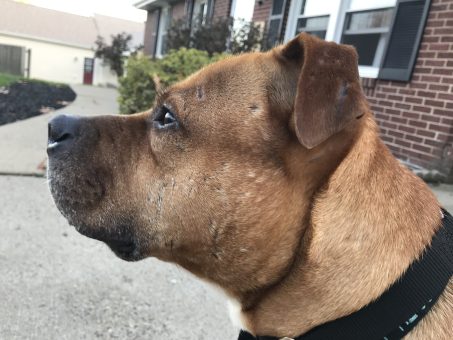
Animal emergencies can be scary for all involved, and with Babesia in the mix, it can be downright terrifying. Working in rescue, and serving the population most impacted by this disease, I share with you the following tales.
First off, meet Babesia. We don’t like you already, you’re sneaky and mysterious, and can be disastrous and even deadly when not treated. Babesia is a single-cell parasite that infects the red blood cells. There is a wide range of symptoms, from a hemolytic crisis causing anemia, lethargy, and weakness – to an enlarged spleen. Treatments range from antibiotics and antimicrobials to blood transfusions. Some infected dogs show no symptoms, and infections can be left unchecked and untreated for months or years. Babesia is also found in humans, in different strains. There is no known risk of transmission from dogs to humans.
How dogs contract Babesia is another doozy. Babesia can be transmitted by ticks. In dogs, tick transmission is certainly a concern – but let us dig down a bit. For a tick to transmit Babesia, it has to be attached for 2-3 days. Owners are getting better at tick checks, thanks Lyme disease, and we have great preventatives on the market today. We can and should be protecting our dogs from tick-borne illnesses. This is one way to cut Babesia off at the door.
So why has our little rescue, in a region not known for the disease, had dozens of Babesia dogs over the years? One word. Dogfighting. As if the brutal underworld of blood sports wasn’t bad enough. Babesia is far too common in survivors of dogfighting, and it is directly related to the “blood” in blood sports. Transmission in the pit has created yet another obstacle for dogs coming out of these felonious enterprises. As with tick transmission, Babesia needs time. The volume of blood, the open wounds, and the agonizing hours the dogs are engaged in fighting for their lives gives Babesia an opportunity that cannot be found anywhere else in the dog universe. Moms also can pass it to pups in utero, creating even more cases in American Pit Bull Terriers.
Babesia is treatable. But it is also complicated. We have seen dogs who were “cured” have Babesia creep back up years later. It can, depending on the strain, be resistant to treatment. But the biggest complication by far is that many veterinarians have never seen a case of Babesia, and so they may not know to look for it. Testing is also not always reliable, so how you test matters.
A Smear test is a small amount of blood placed under a microscope, and viewed by a trained eye. We’ve heard veterinarians refer to this as the “needle in a haystack” method. Antibody tests are another option, however the infection must be active to be detected, and many medications can suppress it enough that it won’t be detected. This is important to know if your dog is being treated with antibiotics or treatments for other diseases. So, treating a UTI while testing for Babesia, for example, may be problematic. There is also a PCR test. The Polymerase Chain Reaction test detects genetic material from a specific organism, such as a virus or infection. PCR testing can also detect all of the four strains of Babesia known to infect dogs. While it’s not 100% accurate, it is 87-98% accurate, and it rarely produces false-positive results. There are also rapid PCR tests in development. The PCR test is more expensive, but it is our standard at Hello Bully.
Batgirl the Pit Bull is a dogfighting survivor from Mississippi. She tested positive during her time in rescue, at around 2 years of age, she was treated and had double clear tests. She has not had any issues related to Babesia in the 3 years since she was clear. She was an easy, straight-forward case.
Keanu is a dogfighting survivor from Parts Unknown. He is heavily scarred over his face and neck. His scars are consistent with dogfighting. When we committed to Keanu, we immediately knew that Babesia might be an issue.
Keanu was initially tested for Babesia while he was being held as evidence in his case. It was a smear test, and it was negative. When Keanu came to Hello Bully, it was determined he was a moderately healthy dog. He landed a great home, and everything was going splendidly, with the exception of his stomach. Keanu was constantly having belly issues. His Mom worked with their veterinarians – all of the veterinarians at the practice – and he was finally diagnosed with kidney disease. However, Keanu also had a couple of elevated or depleted levels in his bloodwork, and his belly issues were still chugging on. Something was still amiss.
Keanu was ultimately sent to Ohio State University, and because of his scars and history, he was re-tested for Babesia via a PCR test and a serology test. The PCR came back negative, possibly due to suppression from Metronidazole used to treat his stomach issues. His serology, however, revealed anti-bodies to Babesia. Another PCR test was done, after he finished the Metronidazole. That second PCR test was positive. Treatment for Keanu was a short, oral course of Atovaquone and Azithromycin. He had two subsequent negative Babesia tests and is considered clear of Babesia. He is living the good life.
Hello Bully’s policy for all dogfighting survivors has evolved over the years. Today, regardless of age and scarring, we go straight to the PCR test. While it’s more expensive, we know it is more reliable, and we know to wait to test if they are being treated for something else with medications that could skew results. For dogfighting survivors, Babesia is just part of the deal, and we educate all adopters.
The way we fight Babesia is through knowledge. When we adopt survivors of dogfighting, we know we are stepping up for dogs who have lived through the unthinkable. We strive to give them a wonderful and comfortable life. This is just one more thing to add to our mental checklist as dog parents.
Unfortunately, Babesia cases are on the rise in the United States. There may be a silver lining – visibility in the veterinary world. However, if a veterinarian ever refuses to test an American Pit Bull Terrier for Babesia because it isn’t “common in the region,” bookmark this for reference. We cannot slay the monsters we cannot see.
Reference materials for this article can be found here.
Podcast: Phil Hatterman of Dog Words Presented by Rosie Fund interviews Little Darling, PFPB Founder:
Listen Here!
About: Rosie Fund|
Pinups for Pitbulls founder Deirdre Darling tells how a tragic circumstance propelled her into her role as an animal advocate.
Pinups for Pitbulls online:
PinupsforPitbulls.org
Facebook
Twitter
Instagram
YouTube
Learn more about the 2023 calendar model call at PinupsforPitbulls.org/model.
Deirdre’s master’s thesis Public Policy: Community Safety Through Breed Bans? analyzes the effects of breed specific legislation (BSL) and the statistics relative to dog bites, dog shelters, and rescue groups. Spoiler alert: BSL does not work!
From the Dog Words archives:
0121: Breed Specific Legislation with Katie and Anthony Barnett
0127: Socio Economic Underpinnings of Breed Specific Legislation
Celebrate 5 years of Rosie Fund by supporting our campaign to sponsor 50 dogs. You can donate at RosieFund.org or through our Facebook page. You can contribute by making a purchase from the store on our website or buying a t-shirt at Bonfire.com. Also check out our page on BarkYours, the online mall with gifts for people who love their dogs.
Thesis Now Available in French!
Politique publique: La Securite des collectivites par le biais d’une interdiction sur les races? by Deirdre S. Franklin
HUMONGOUS thanks to Céline Dussault for translating Deirdre’s thesis into French!
Abstract coming soon.


Sites we love & trust for Dog Training & more…
Kelley Bollen
Hello Bully
Fit4apit
Lili Chin Infographics
Dognostics
ASPCA Pro
Learn How to Fight Breed Specific Legislation
Watch the recorded webinar here.
This interactive discussion presents the scientific facts of why BSL (Breed Specific Legislation) does not make communities safer. Deirdre Franklin provides a strong case as to why the focus should be on individual dog owners rather than entire breeds or types of dogs.
BSL is a hot topic that affects dog owners, non-dog owners, dog trainers, and their clientele. This presentation will provide solutions for effective community safety through breed neutral recommendations.
Learning Objectives
- To understand why Breed Bans do not improve community safety, where these laws are in effect, and where they have been overturned.
- To learn how to spot the facts versus the myths and to identify “junk-science” and “fake-news” through history and arcane myths.
- To understand the adverse effects of breed specific legislation. We will discuss potentially poor decision-making by dog owners as well as the costs to taxpayers.
- How to prevent dog bites through education, community safety, empowerment and inclusion.
- Creating allies and partnerships to increase the effectiveness of your message and how to build a movement that becomes the norm
About The Presenter

Deirdre Franklin, MSPP
Education
First and foremost, we are a group of humane educators. PFPB works alongside dog trainers, behaviorists, rescue organizations, and other animal welfare groups to obtain only the most recent, well researched information possible. Funds are used to create educational materials, train our staff of volunteers, and host educational seminars and programs for the public. PFPB believes that education is the key to combat breed discrimination, animal cruelty, and pet over-population. We routinely collaborate with various other organizations to create a set of educational materials and quick fact guides that will help any dog owner or animal lover effectively and logically defend their companions against breed discriminatory laws that threaten their cities and towns. We also seek to keep this type of information updated with the most recent, factual, scientific-based research that we can endorse to help all communities.
Coloring Pages
Feel free to share them far and wide! Share the colored pages with us at #pfpbcoloringpages on Instagram at @pinupsforpitbullsinc
Download the Coloring Page: Comic-WorthMoreAlive
Rescue
PFPB also directly helps individual dogs in need, rescues and shelters. Most of our volunteers are directly involved in their own rescue work in their communities. Our founder is an active volunteer with the Asheville Humane Society’s CGC program. She also assists with HSUS Animal Rescue Team when called upon, and most recently assisted on a puppy mill/hoarding bust in GA in 2017 where she adopted a little Pomeranian named Pepita Nugget O’Possum. In the past, she was on the front lines of the Winslow Township dog hoarding bust, helping humane law officers handle, treat, and re-home over thirty pit-bull type dogs seized from one property along with rescue efforts following Hurricane Katrina and Hurricane Sandy.
PFPB has also assisted in numerous emergency rescue situations. Each year, we directly coordinate the saved lives of over 1,100 dogs on average through our social media platforms with courtesy posts.
Rehabilitation
We believe that all dogs should be considered for rehabilitation, and all dogs deserve a chance. In the past, PFPB sponsored the health care and veterinary bills for countless dogs. This included victims of severe cruelty, Willie and Kate, who suffered axe wounds to their skulls before they were rescued. Leonidas the Brave, a puppy who was dangled over a fence as bait for fighting dogs, lost two of his limbs and was sponsored by PFPB. We will support any rescue organization or shelter that is pit-bull type dog friendly, practices humane training methods, and believes that each life is worthy of its time. PFPB supports positive reinforcement training, smart dog handling methods, and an overall sense of proper dog ownership. While this support is not always monetary, we have access to our vast network which can assist in almost every case. Our courtesy posts also provide marketing relief for the overtaxed rescues, shelters, and individuals in need. We provide a unique resource to our community so that each organization can focus on what they do best! It’s a group effort and we are proud to be able to work together with so many wonderful people to help our beloved fur friends in need.
Download Professional Conference Audio Recordings including 2017 Pet Professional Guild courses which includes Deirdre Franklin’s presentation on fighting BSL. Downloads also include many other incredible animal welfare conference courses. Click the image below for more info.
Awareness
We have partnered with some amazing humane educators over the years. This has included Animal Planet’s “Pit Boss,” Luigi “Shorty” Rossi; as well as author of the bestselling book Oogy: the Dog Only a Family Could Love, Larry Levin. We have also worked with The Pet Professional Guild and recently became a Best Friends Network Partner. PFPB raises awareness for the plight facing pit-bull type dogs and shelter dogs of all breed types in the world today. PFPB regularly focuses its efforts to garner positive media attention through its direct following at events throughout the country and abroad. PFPB hopes that every person they reach will embrace our message, share it, and help to change the current status for pit-bull type dogs around the world.
Fight Fiction with FACTS: Deirdre Franklin’s Master’s Thesis (Case Study) on Breed Specific Legislation is now available online on the HSUS Animal Studies Repository.
Abstract
The research performed provided several insights and outcomes that were anticipated in the research question. By analyzing the effects of breed specific legislation (BSL) and the statistics relative to dog bites, dog shelters and rescue groups, it became clear that the BSL does not work. This case study provides extensive proof to support this conclusion.
Franklin, Deirdre S., “Public Policy: Community Safety Through Breed Bans?” (2013). Animals and Public Policy. 1.
http://animalstudiesrepository.org/anippol/1
Read it here.
—
PEOPLE Magazine Feature: 10 Myths About Pit Bulls Debunked by Deirdre Franklin & Linda Lombardi
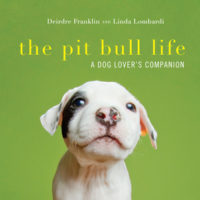
All dogs are special, but living with a pit bull really is different. While they’re incredibly popular, they also have a reputation that makes many fear them. Pit bull owners know how loyal and lovable their dogs are, but they can be affected by unfair laws and policies. In The Pit Bull Life you’ll learn the history of this category of dog and what you can do to help secure its present and future. You’ll also get information about how to find a good match and read inspiring stories of people who’ve devoted their lives to this special dog. In an effort to clear the pit bull name, the authors of The Pit Bull Life debunked 10 popular pit bull myths for PEOPLE.
Read the whole piece here.
—
The Pet Professional Guild OPPOSES Breed Specific Legislation. Read their Position Statement here. Read what the experts say here.
—
Fostering Article by Linda Lombardi featuring Carrie Santiago, Our 2016 Pin-Up in Associated Press:
Ask anyone who fosters dogs and they’ll tell you that everyone says it.
“I hear it almost every time I adopt out a dog: ‘I don’t know how you do this, I wouldn’t be able to let them go,'” says Anne Auditore of Richmond, Virginia, intake coordinator for Mid-Atlantic Pug Rescue. But many people who foster dogs have pretty much the same reply: Sure, you sometimes feel that way — but not as much as you might think. Says Auditore, “You can love them all, but they’re still not a good fit for your family.”
The kids wouldn’t be able to stand it, though, right? Forming an attachment and then saying goodbye?
In fact, in Denise Dunn’s case, fostering was her daughter’s idea.
“We had the dog for one day and she was all, ‘We can never give this dog back,'” says Dunn, who fosters for the Southside SPCA in Virginia. “However, after several days, she came to her senses and realized we were not looking for another member of our family, we’re looking to help find this dog a home.”
OK, so maybe the kids are good with it, but what about the dog you already have?
First impressions are important. “You have to understand that each animal is going to change the dynamic of your household in a different way,” says Carrie Santiago of Santa Rosa Beach, Florida, who fosters for The Southern Dog. “I always introduce them in a neutral area. I don’t bring a dog into my home and say, ‘Have a free-for-all.'”
Read more, or download PDF: Saying goodbye
These Pretty Ladies Would Like To Talk To You About Pit Bulls: By Arin Greenwood of Huffington Post
Hey sailor, would you like to talk about why laws that ban or otherwise restrict the ownership of pit bulls aren’t an effective way to promote public safety?
Deirdre Franklin has been combining her interests in slinky retro fashion and blocky headed dogs for about a decade now.
The founder of Pinups for Pitbulls, Franklin is a burlesque performer going by the stage name “Little Darling.” She got involved in the dog cause while volunteering as a teenager at a Philadelphia animal shelter that had a policy of putting down every pit that came through its doors.
After one especially heartbreaking euthanasia, she sought out a pit bull of her own, and came to adopt a pup named Carla Lou from a Texas rescue group who shipped the dog even though Franklin was so young and far away. Read more here.
Recent Dog Bite Research by National Canine Research Council in JAVMA:
A COMPREHENSIVE STUDY USING A NEW APPROACH
In December, 2013, The Journal of the American Veterinary Medical Association (JAVMA) published the most comprehensive multifactorial study of dog bite-related fatalities (DBRFs) to be completed since the subject was first studied in the 1970’s.1 It is based on investigative techniques not previously employed in dog bite or DBRF studies and identified a significant co- occurrence of multiple potentially preventable factors. Read the full study here.
Objective—To examine potentially preventable factors in human dog bite–related fatalities (DBRFs) on the basis of data from sources that were more complete, verifiable, and accurate than media reports used in previous studies.
Design—Prospective case series.
Sample—256 DBRFs occurring in the United States from 2000 to 2009.
Procedures—DBRFs were identified from media reports and detailed histories were compiled on the basis of reports from homicide detectives, animal control reports, and interviews with investigators for coding and descriptive analysis.
Results—Major co-occurrent factors for the 256 DBRFs included absence of an able-bodied person to intervene (n = 223 [87.1%]), incidental or no familiar relationship of victims with dogs (218 [85.2%]), owner failure to neuter dogs (216 [84.4%]), compromised ability of victims to interact appropriately with dogs (198 [77.4%]), dogs kept isolated from regular positive human interactions versus family dogs (195 [76.2%]), owners’ prior mismanagement of dogs (96 [37.5%]), and owners’ history of abuse or neglect of dogs (54 [21.1%]). Four or more of these factors co-occurred in 206 (80.5%) deaths. For 401 dogs described in various media accounts, reported breed differed for 124 (30.9%); for 346 dogs with both media and animal control breed reports, breed differed for 139 (40.2%). Valid breed determination was possible for only 45 (17.6%) DBRFs; 20 breeds, including 2 known mixes, were identified.
Conclusions and Clinical Relevance—Most DBRFs were characterized by coincident, preventable factors; breed was not one of these. Study results supported previous recommendations for multifactorial approaches, instead of single-factor solutions such as breed-specific legislation, for dog bite prevention.
Homeowners Insurance for Dog Lovers
You’ve asked us for a “cheat sheet” on dog friendly homeowner insurance companies. We listened! The following PDF is available for download and is chock full of great insurance companies that do not discriminate based on “breed.” Some even give back to dog rescue! Feel free to share!
Educational Handouts
Since 2005, Pinups for Pitbulls has worked to educate the public about the history and temperament of the American Pit Bull Terrier, and to raise awareness about breed specific legislation and breed discriminatory policies. Game Dog Guardian is a steward not only of dogs, but also of people, ideas, liberty, community, critical thinking, and equality. Sharing a similar vision, PFPB teamed up with Game Dog Guardian to create a nexus of community outreach and education to further their mission. Read more
Check out our Dog Training FAQ for the betterment of the human-canine bond.

Bud: 1st Dog to drive cross country in 1903!

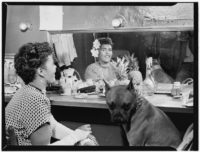
Famed singer, Billie Holiday with her dog Mister.
—
Pass the Leash Challenge Featuring Pinups for Pitbulls Essential Workers During COVID-19



